 |
|
China is mulling financial incentives to encourage couples to have a second child, as surveys show many are reluctant to expand their families due to economic constraints.[Wang Biao/For China Daily]
|
China is mulling financial incentives to encourage couples to have a second child, as surveys show many are reluctant to expand their families due to economic constraints.
Wang Pei’an, vice-minister of the National Health and Family Planning Commission, revealed the potential move at a social welfare conference on Saturday.
Top decision-makers last year relaxed the more than four-decade-old family planning policy to allow, if not encourage, all Chinese couples to have a second child.
Nationwide, the change led to 17.8 million births in 2016, an increase of more than 1.3 million compared with the previous year and the biggest annual increase in 20 years.
“That fully met the expectations, but barriers still exist and must be addressed,” Wang told the conference. “To have a second child is the right of each family in China, but affordability has become a bottleneck that undermines the decision.”
A survey by the commission in 2015 found that 60 percent of families polled expressed reluctance to have a second baby largely due to economic constraints.
To address that, Wang said, the government is considering introducing supporting measures including “birth rewards and subsidies” to encourage people to have another child.
It is the first time that the top population authority has suggested such a move to boost the birthrate, according to Yuan Xin, a professor at Nankai University in Tianjin.
The Hunan provincial statistics authority also suggested in a recent report that the local government give subsidies to couples having a second baby to help reverse falling fertility rates.
“It’s not easy, and a ‘baby bonus’ plan should be applied evenly nationwide as all government policies should be transparent and fair for all,” he said, adding that the population authority alone cannot handle such a plan as it requires consensus and cooperation among all authorities.
In some low-fertility countries like Japan, baby incentives such as cash subsidies, prolonged maternity leave, tax breaks, and child and healthcare benefits have been introduced by the government to boost the population.
China, however, is a different case, according to Yuan, who explained that the nation still faces challenges from a huge population base and limited natural and public resources to sustain population development.
“It’s not the right time to introduce any financial incentive plans,” he said.
Also, “the second-child policy is a choice by the top decision-makers facing a dilemma of the existing challenges and structural population problems like rapid aging and a shrinking workforce”, he said.
After all, having one or two children should be a decision made by the families themselves, Yuan said.
A mother of a 3-year-old girl in Beijing said: “I don’t expect cash from the government for a second child. Sound social public policies to help working parents raise the children are needed more.”
The woman, surnamed Bai, referred to prolonged maternity leave, equal working opportunities for mothers, easy access to quality education resources for children and a well-functioning social welfare system.
